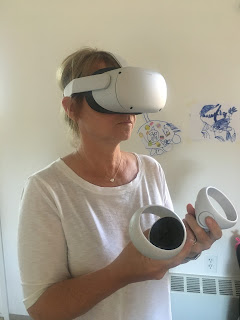So let me suppose that I have written a play for a group of sixth graders about the pantheon of Greek gods. It's a comedy and it takes the audience from Mt. Olympus, where Zeus is peeved because no one on earth believes in him or his underling gods any longer, down to earth where they must determine what caused the shift in devotion. It's a 50-minute piece for sixty students with four musical numbers and twelve scene changes that teaches the names and roles of the gods, the importance of polytheism during Ancient Greece, the clothes, customs and culture of the time as well as a moral imperative about the nature of goodness. That's a lot for students to take in and most of them will have strong feelings about one thing or another. They might not understand certain lines or certain constructs. They might not understand where their character fits into the story. They might think something is very funny (or not!) and not have the opportunity to express those thoughts.
CUE...Hypothes.is where you can "increase student engagement, expand reading comprehension, and build critical-thinking and community in classes." Collaborative annotation makes reading active, visible and social, enabling students to engage with their text, teachers, ideas and each other in deeper and more meaningful ways.
It would be very interesting to do a second or third read through of a play with students being able to ask their questions, make comments and comment on their peer's comments in real time. It would be a very dynamic experience of the material and work towards building the necessary collaborative relationship that makes a theater piece successful.
~ J


Comments
Post a Comment